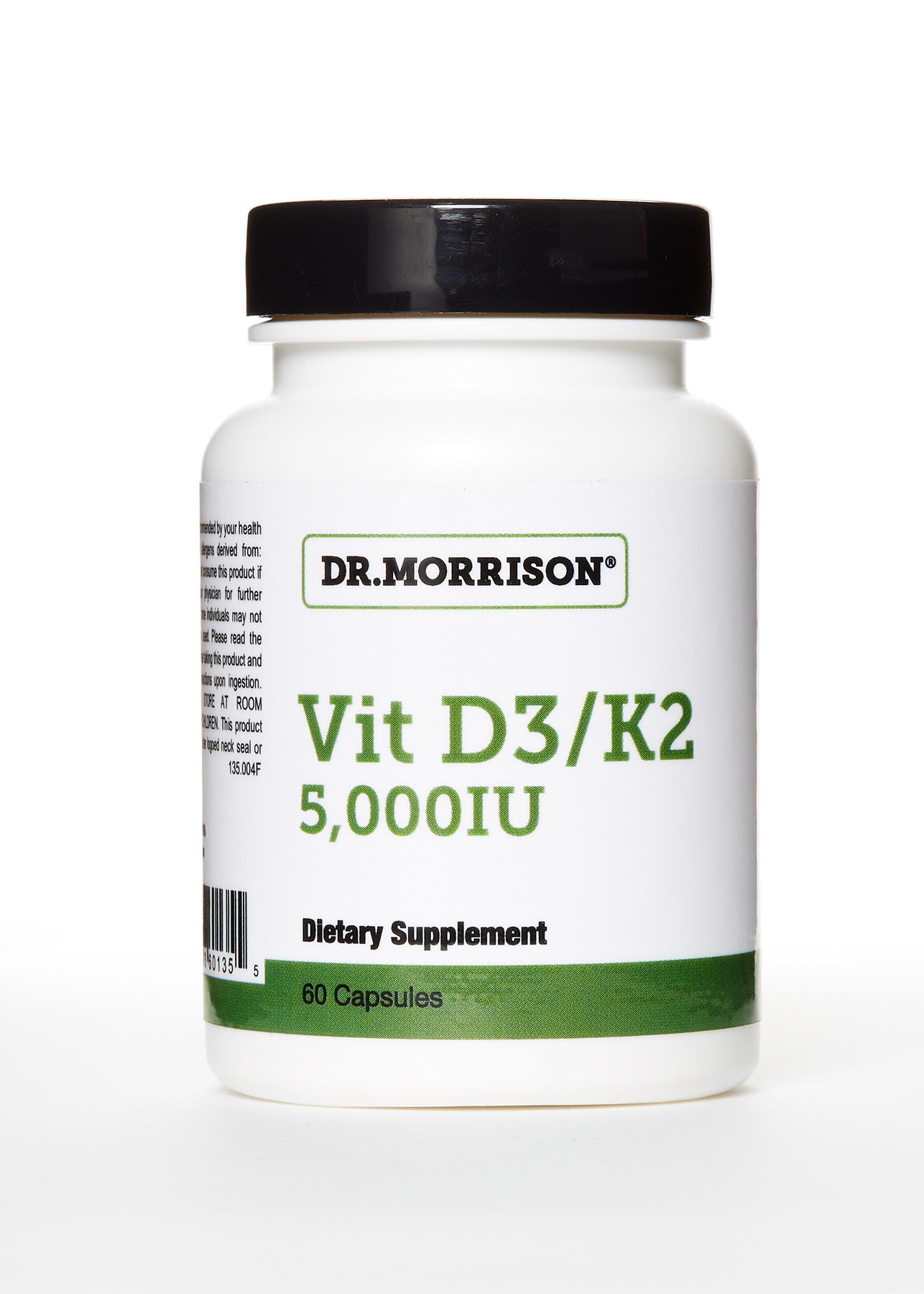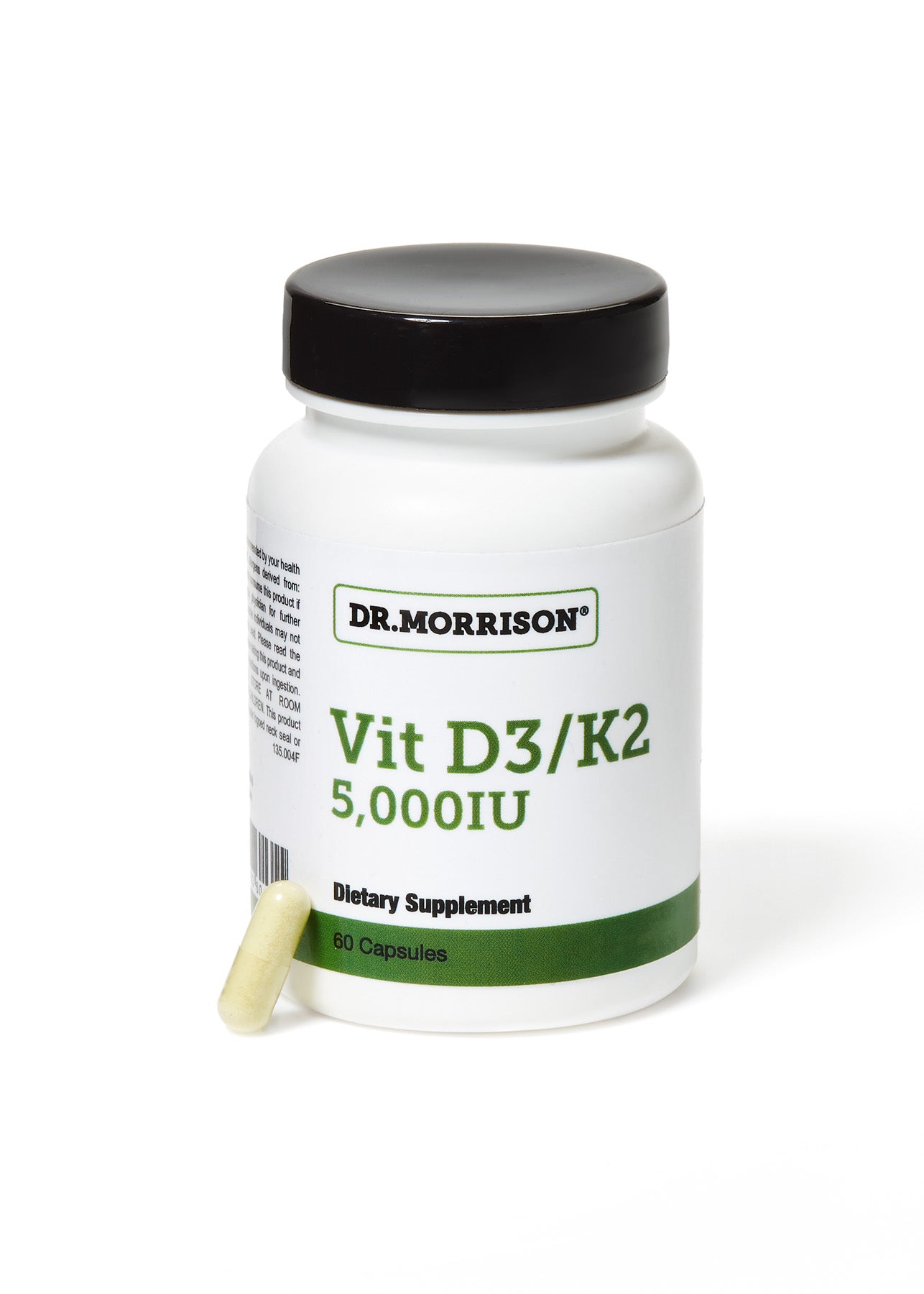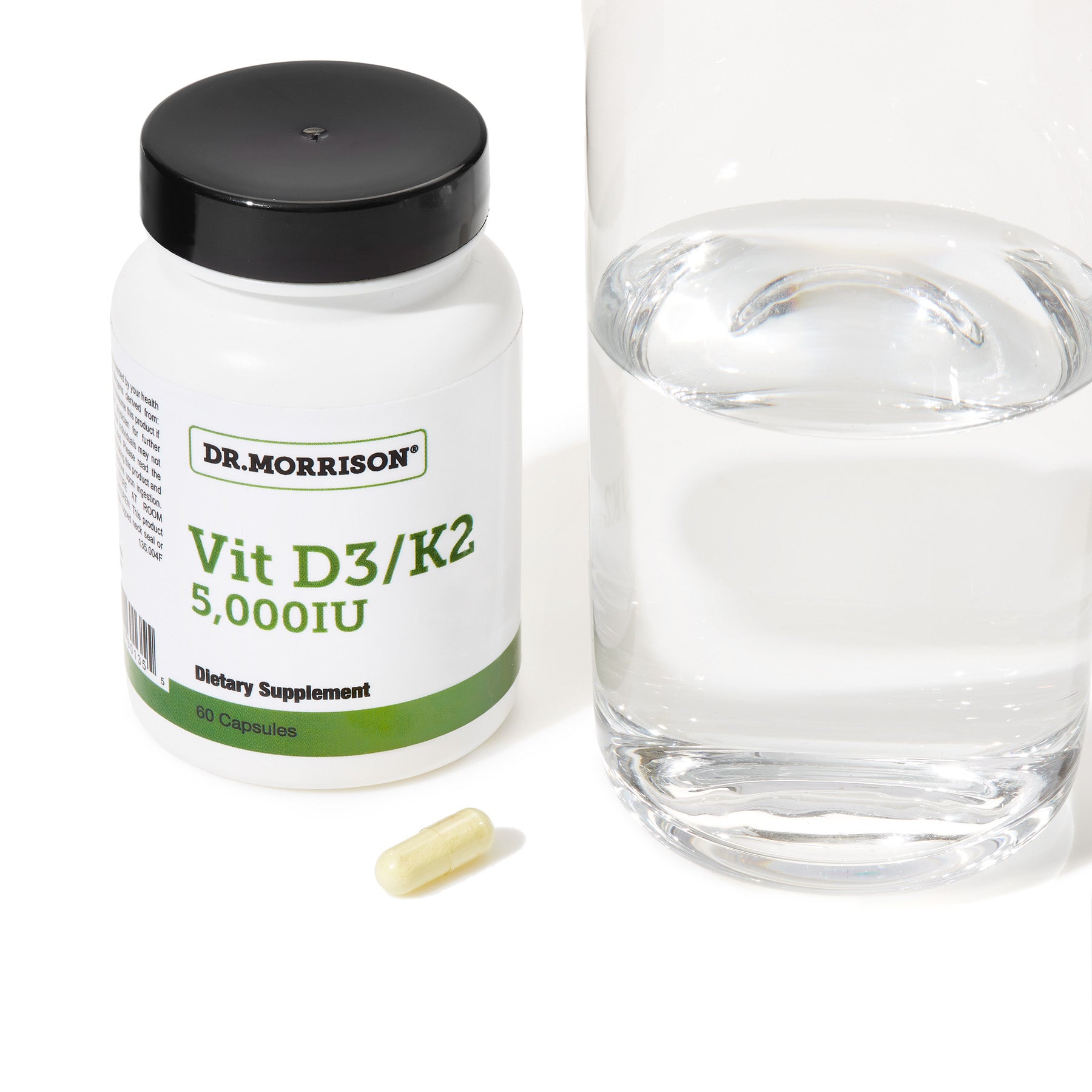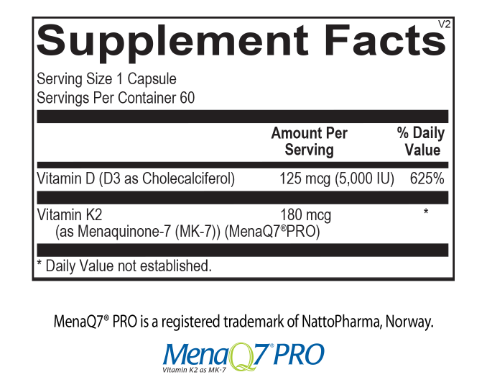Vitamin D3/K2
$ 45.00
Size: 60 Capsules
This Potent Formula Combines High Levels of Vitamins D3 and K2, Effectively Boosting Immunity, Strengthening Bones, and Enhancing Cardiovascular Health.*
Please select all options.
Vitamin D3/K2 5000 IU provides a daily dose of vitamin D3 and K2 in a convenient mini capsule. A growing body of research shows that the combination of these two vitamins provides optimal support to the body, including bone health, arterial health, and immune system balance.*
- Supports Bone Health*: Vitamin D stimulates calcium absorption and reduces calcium excretion, encouraging the maintenance of healthy bones. Vitamin K2 works synergistically with D3 to keep calcium in bones and out of soft tissues like the heart.1
- Supports Brain Health*: Positive associations have been found between adequate serum vitamin D and cognitive function.2,3
- Promotes Healthy Immunity*: Higher blood levels of D3 and K2 have been linked with stronger immune function and a balanced inflammatory response,4 which may help protect against infection,5 autoimmunity, and certain cancers.*
- Improves Athletic Performance*: Studies have shown that vitamin D can help increase aerobic capacity, muscle growth, and strength.6
- Improves Body Composition*: Vitamin D insufficiency is associated with obesity,7 and vitamin D supplementation has been shown to assist in weight loss.*[8]
- Supports Cardiovascular Health*: Vitamin D and K have been shown to have a synergistic, protective effect against arterial calcification.*[9,10]
Research finds that nearly half of Americans are vitamin D deficient, and many experts believe higher levels are needed for optimal health.11 Vitamin D is best obtained from natural sun exposure, but living at northern latitudes, spending daytimes indoors, and air pollution make it nearly impossible to get enough. Furthermore, low vitamin D has been correlated with countless chronic conditions and our needs increase with age, so supplementation may be beneficial.12
*These statements have not been evaluated by the FDA and are not intended to treat or cure any disease.
Vitamin D3/K2 5000 IU is one of our absolute essentials for all-around health. You might benefit from Vitamin D3/K2 5000 IU if you…
- Need support for bone growth and density
- Want to support your immune system
- Do not get enough sun exposure
- Do not eat vitamin D-rich foods, like duck eggs, sardines, mackerel, and liver
- Are physically active
Why Dr. Morrison's Vitamin D3/K2 5000 IU Stands Out:
- Potent Vitamin Forms: each capsule provide 180 mcg of MenaQ7® PRO, the top-researched form of vitamin K2 as MK-7, and 5,000 IU of vitamin D3 for optimal bone and cardiovascular support.
- High Bioavailability: Vitamin D3 (cholecalciferol) is easily converted to its active form in the kidneys, ensuring better absorption.
- Advanced Vitamin K2: Contains MK-7 (MenaQ7® PRO), the most bioactive form of Vitamin K2, proven in over 15 clinical trials to have superior absorption and a longer half-life compared to other types like MK-4 or K1.
- Proven Results: The chosen form of Vitamin K2 is not only the most studied but also demonstrates consistent results in improving bone and cardiovascular health.
1 Capsule per serving
Vitamin D (D3 as Cholecalciferol) 125 mcg (5,000 IU)
Vitamin K2 (as Menaquinone-7 (MK-7)) (MenaQ7®PRO) 180 mcg
Other Ingredients: Microcrystalline Cellulose, Hypromellose (Natural Vegetable Capsule), Magnesium Stearate, Silicon Dioxide and Stearic Acid.
1 capsule per day or as recommended by your health care professional.
Cautions: If you are pregnant or nursing, consult your physician before taking this supplement. All forms of Vitamin K may interact with blood thinning medications. If you are taking such medicines please consult with your physician before taking this supplement.
Randomized trial of vitamin D supplementation to prevent seasonal influenza A in schoolchildren
Background: To our knowledge, no rigorously designed clinical trials have evaluated the relation between vitamin D and physician-diagnosed seasonal influenza.
Objective: We investigated the effect of vitamin D supplements on the incidence of seasonal influenza A in schoolchildren.
Design: From December 2008 through March 2009, we conducted a randomized, double-blind, placebo-controlled trial comparing vitamin D(3) supplements (1200 IU/d) with placebo in schoolchildren. The primary outcome was the incidence of influenza A, diagnosed with influenza antigen testing with a nasopharyngeal swab specimen.
Results: Influenza A occurred in 18 of 167 (10.8%) children in the vitamin D(3) group compared with 31 of 167 (18.6%) children in the placebo group [relative risk (RR), 0.58; 95% CI: 0.34, 0.99; P = 0.04]. The reduction in influenza A was more prominent in children who had not been taking other vitamin D supplements (RR: 0.36; 95% CI: 0.17, 0.79; P = 0.006) and who started nursery school after age 3 y (RR: 0.36; 95% CI: 0.17, 0.78; P = 0.005). In children with a previous diagnosis of asthma, asthma attacks as a secondary outcome occurred in 2 children receiving vitamin D(3) compared with 12 children receiving placebo (RR: 0.17; 95% CI: 0.04, 0.73; P = 0.006).
Conclusion: This study suggests that vitamin D(3) supplementation during the winter may reduce the incidence of influenza A, especially in specific subgroups of schoolchildren. This trial was registered at https://center.umin.ac.jp as UMIN000001373.
Vitamin D status and its relationship to body fat, final height, and peak bone mass in young women
Context: Vitamin D insufficiency has now reached epidemic proportions and has been linked to low bone mineral density, increased risk of fracture, and obesity in adults. However, this relationship has not been well characterized in young adults.
Objective: The objective of the study was to examine the relationship between serum 25-hydroxyvitamin D (25OHD), anthropometric measures, body fat (BF), and bone structure at the time of peak bone mass.
Design: This was a cross-sectional study. OUTCOME MEASURES AND SUBJECTS: Anthropometric measures, serum 25OHD radioimmunoassay values, and computed tomography and dual-energy x-ray absorptiometry values of BF and bone structure in 90 postpubertal females, aged 16-22 yr, residing in California were measured.
Results: Approximately 59% of subjects were 25OHD insufficient (or=30 ng/ml). Strong negative relationships were present between serum 25OHD and computed tomography measures of visceral and sc fat and dual-energy x-ray absorptiometry values of BF. In addition, weight, body mass, and imaging measures of adiposity at all sites were significantly lower in women with normal serum 25OHD concentrations than women with insufficient levels. In contrast, no relationship was observed between circulating 25OHD concentrations and measures of bone mineral density at any site. Unexpectedly, there was a positive correlation between 25OHD levels and height.
Conclusions: We found that vitamin D insufficiency is associated with increased BF and decreased height but not changes in peak bone mass.





